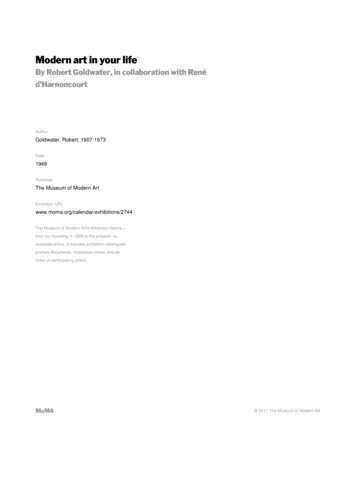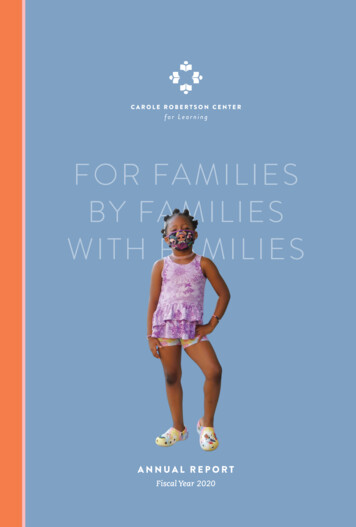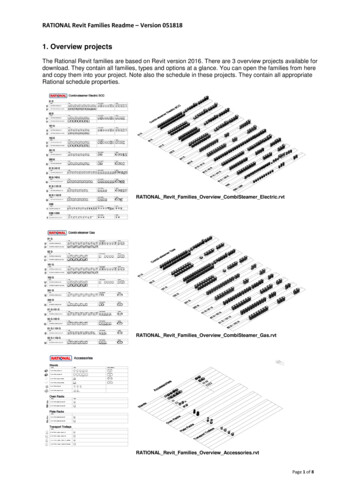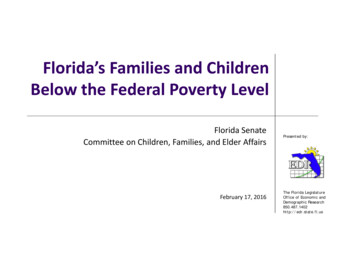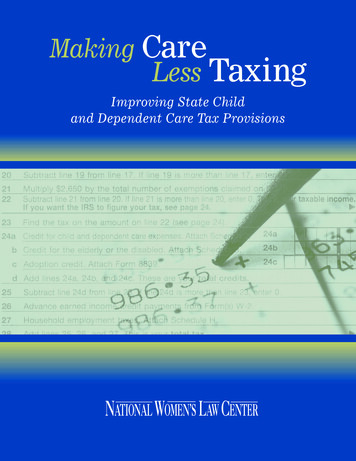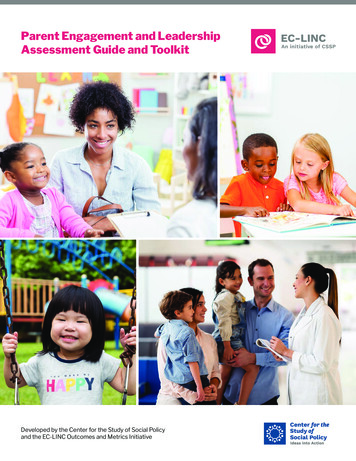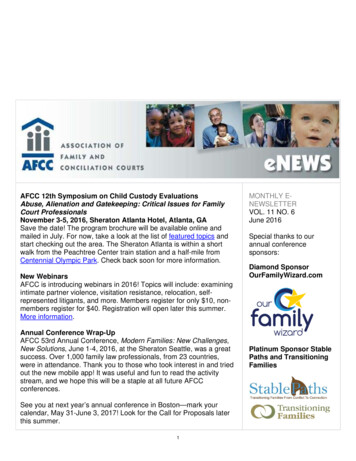
Transcription
Corinne rsday, June 23, 2016 2:43 AMCorinne BennettJune 2016 Symposium on Child Custody Evaluations AFCC Awards AFCC MemberNewsAFCC 12th Symposium on Child Custody EvaluationsAbuse, Alienation and Gatekeeping: Critical Issues for FamilyCourt ProfessionalsNovember 3-5, 2016, Sheraton Atlanta Hotel, Atlanta, GASave the date! The program brochure will be available online andmailed in July. For now, take a look at the list of featured topics andstart checking out the area. The Sheraton Atlanta is within a shortwalk from the Peachtree Center train station and a half-mile fromCentennial Olympic Park. Check back soon for more information.New WebinarsAFCC is introducing webinars in 2016! Topics will include: examiningintimate partner violence, visitation resistance, relocation, selfrepresented litigants, and more. Members register for only 10, nonmembers register for 40. Registration will open later this summer.More information.Annual Conference Wrap-UpAFCC 53rd Annual Conference, Modern Families: New Challenges,New Solutions, June 1-4, 2016, at the Sheraton Seattle, was a greatsuccess. Over 1,000 family law professionals, from 23 countries,were in attendance. Thank you to those who took interest in and triedout the new mobile app! It was useful and fun to read the activitystream, and we hope this will be a staple at all future AFCCconferences.See you at next year’s annual conference in Boston—mark yourcalendar, May 31-June 3, 2017! Look for the Call for Proposals laterthis summer.1MONTHLY ENEWSLETTERVOL. 11 NO. 6June 2016Special thanks to ourannual conferencesponsors:Diamond SponsorOurFamilyWizard.comPlatinum Sponsor StablePaths and TransitioningFamilies
Congratulations Award RecipientsThe John E. VanDuzer Distinguished Service Award waspresented to Sherrie Kibler-Sanchez and Ernie Sanchez; the StanleyCohen Distinguished Research Award was presented to StephanieCoontz; the Irwin Cantor Innovative Program Award was awardedto the Enhancing Families Through Literature program; the MeyerElkin Essay Award was presented to William J. Howe, III andElizabeth Potter Scully; and the Tim Salius President’s Award waspresented to Nicola Taylor and Marilyn Freeman, with SpecialCommendation to Janet Walker. Congratulations to all and thankyou for your contributions.Poster GalleryPosters representing current research, practice and policy weredisplayed at annual conference. PDF versions of some of the postersare available here. Thank you to all of our poster authors.Certificates of AttendanceIf you attended the conference and require a certificate ofattendance, they are available online for a processing fee of 15 formembers and 20 for non-members. If you did not sign up for acertificate with your registration, this fee can be paid online.More informationConference MaterialsThere are a limited number of USB drives containing conferencesession handouts available for purchase. The cost for a USB drive is 15 for members and 25 for non-members, shipping fees apply. Callthe AFCC office at 608-664-3750 or email afcc@afccnet.org to order.Giving ThanksThis conference would not have been the incredible success it waswithout the help of many extraordinary people and organizations.Thank you to the Washington Chapter of AFCC and its Board ofDirectors; our conference sponsors, collaborating organizations,conference program committee, conference shepherds, presenters,exhibitors, advertisers, dine around leaders, hospitality suite hosts,auction donors, volunteers and bidders, and, of course, everyonewho attended.Thank You Scholarship Fund DonorsThis past year your generosity provided 31 full conferencescholarships and 10 travel stipends, giving more individuals theopportunity to attend AFCC conferences. The opportunities you havegiven the recipients truly make a lasting difference in their practiceand careers. Thank you to everyone who donated to the 2015-2016appeal. Although our goal was met for this year, every donation helpsaward more scholarships and travel stipends.2AFCC 12th Symposiumon Child CustodyEvaluationsAbuse, Alienation andGatekeeping: CriticalIssues for Family CourtProfessionalsNovember 3–5, 2016Sheraton Atlanta HotelAtlanta, GeorgiaChapter AnnualConferencesMinnesota Chapter AnnualConferenceJuly 14, 2016St. Paul, MinnesotaAustralia Chapter AnnualConferenceAugust 18-20, 2016Brisbane, QueenslandWisconsin Chapter AnnualConferenceSeptember 16, 2016Pewaukee, WisconsinFlorida Chapter AnnualConferenceSeptember 28-30, 2016Orlando, FloridaIndiana Chapter AnnualConferenceOctober 7, 2016Indianapolis, IndianaColorado Chapter AnnualConferenceOctober 7-9, 2016Breckenridge, ColoradoOntario Chapter AnnualConferenceOctober 21, 2016
Donate today.Toronto, OntarioAFCC Board Approves IPV GuidelinesThe AFCC Board of Directors has unanimously approved newGuidelines for Examining Intimate Partner Violence: A Supplement tothe AFCC Model Standards for Child Custody Evaluation. TheGuidelines are aspirational in nature, and were developed to assistmembers of AFCC and others who conduct child custodyevaluations, and examine how they should identify the occurrence ofintimate partner violence and the possible effects on children,parenting, and co-parenting. The task force was sponsored byAFCC, in collaboration with the National Council of Juvenile andFamily Court Judges, and in consultation with the Battered Women’sJustice Project.Arizona Chapter AnnualConferenceJanuary 27-29, 2017Sedona, ArizonaNewly Elected AFCC OfficersPlease welcome our new AFCC Executive Committee: President,Marsha Kline Pruett, PhD, MSL, Northampton, Massachusetts;President Elect, Annette T. Burns, JD, Phoenix, Arizona; VicePresident, Hon. Dianna Gould-Saltman, Compton, California;Secretary, Matthew J. Sullivan, PhD, Palo Alto, California; Treasurer,Mindy F. Mitnick, EdM, MA , Edina, Minnesota and Past President,Hon. Peter Boshier, Wellington, New Zealand. Thank you to alloutgoing officers for their hard work and service.Chapter NewsMaryland received its chartered chapter status at the Seattle AFCCBoard Meeting. Welcome to AFCC’s 21st chartered chapter!Are you an AFCC member?Join or RenewThe opinions expressed inarticles published or linkedto in the AFCC eNEWS arethose of the authors and donot necessarily reflect thepositions of the Associationof Family and ConciliationCourts.Editor:Leslye Hunterlhunter@afccnet.orgAssociate Editor:Corinne SchlachterAssistant Editor:Carly MarcoMember NewsDr. Mark L. Goldstein, Illinois, is the editor of the recently publishedbook Handbook of Child Custody. More Information.Dr. Howard Drutman, Georgia, is the author of the recently publishedbook Divorce: The Art of Screwing Up Your Children. MoreInformation.Conferences of InterestThe NCJFCJ 79th Annual Conference will be held in Monterey,California, July 17-20, 2016. The program features presentations oncurrent and cutting edge topics that will inspire, provoke, andprecipitate discussions about issues facing the juvenile and familycourt system. Plenary sessions highlighted by topic specific trainingtracks on family law, juvenile justice, child welfare, and familyviolence; as well as tracks featuring practical and innovative solutionsare just the beginning of the educational offerings of the NCJFCJ's79th Annual Conference.The International Family Law Conference (IFLC) will be held in3UnsubscribeAFCC 6525 Grand Teton Plaza Madison, WI 53719 608-6643750 afcc@afccnet.org www.afccnet.org
Singapore from September 29-30 at the Supreme Court Auditorium.Themed “The Future of Family Justice: International and Multidisciplinary Pathways,” the conference will see experts from thejudicial, legal, psychological, social science and ADR sectors comingtogether to share insights into the needs and challenges for FamilyJustice systems around the world now and into the future.Free eBook Download of the MonthThis month, we are offering the Essays from the Family CourtReview—Social Science Research. This collection of essays focuseson social science as a bridge to practice and policy. Articlesshowcased follow an introduction exploring how social scienceresearch can contribute to family law practice and policy. Editor:Marsha Kline Pruett. (2013). View and download the eBook(members only). Order this book.4
AFCC 53rd Annual Conference Exhibitors7th World Congress on Family Law andChildren's C Illinois Chapterwww.afccillinois.orgAFCC Washington Chapterwww.wa-afcc.netinfo@wa-afcc.netAmerican Inns of rnia University Global OnlineConflict Resolution Studieswww.calu.eduross@calu.eduCenter for Children, Families & the Law –Maurice A. Deane School of Lawat Hofstra entercoParenter.orgjonathan@coparenter.orgFamily Court SSN%291744-1617matthew.kiernan@hofstra.eduFamily Law tware.comFina Estampa Perujespinozanima@gmail.comJAYC Foundation, es.comListen 2 Kids Mediate.comMediate.comadmin@mediate.comNavajo Jewelry & Craftsrsanchez4893@yahoo.comNew Ways for ies.comOpen Palm rd.comOvercoming arriers.orgUnhooked iley.comepiper@wiley.com
AFCC 12th Symposium on Child Custody EvaluationsAbuse, Alienation and Gatekeeping: Critical Issues for Family CourtProfessionalsNovember 3-5, 2016, Sheraton Atlanta Hotel, Atlanta, GAFeatured topics:Pre-Symposium Institutes: Advanced psychological testing Advanced issues in mediation Nuts and bolts of child custody evaluations IPV and custody evaluation guidelines30 Workshops include: Alienation and estrangement Developing your skills as a testifying expert Gatekeeping Ethical Issues in child custody Relocation Allegations of abuse in child custody cases What judges and lawyers need to know about child custody evaluations Conducting effective collateral interviews
Conference Program CommitteeHon. Denise McColley, Co-chairMatthew J. Sullivan, PhD, Co-chairLawrence Braunstein, JDMilfred Dale, PhD, JDStacy Heard, JDDavid Hodges, MA, LMFTJohn Kydd, JDDaniel Pickar, PhD, ABPPMichael Saini, PhDArnold T. Shienvold, PhDConference ShepherdsSunitha AnjilvelCaewyn BarnettAllison BeattieEmily BrewerElizabeth BuieDesiree CanterSarah ContiRory HardyChris JonesConnor LenzPaul McVickerJodie NathanJohn PlummerCarol RodriguezStephen ThompsonDarcia TudorHolly Winter Duke
Scholarship Fund Contributors 2015-2016Diamond ( 1,000– 4,999)Arizona ChapterMary FerriterDianna Gould-SaltmanPeter Salem and Iris ShashaSuzie S. Thorn Family FoundationPlatinum ( 500– 999)Alberta ChapterPeter BoshierAnnette BurnsColorado ChapterBarbara FidlerWilliam HoweEmile KruzickMassachusetts ChapterKathleen McNamaraOntario ChapterArnold ShienvoldRobert SimonRobert SmithPhilip and Ruth StahlWashington ChapterGold ( 250– 499)Karen AdamNicholas BalaDolores BomradLawrence BraunsteinKelly Browe OlsonPhil BushardMilfred DaleRobin DeutschSamuel FerraraLarry FongBeth HarringtonIllinois ChapterIn honor of Lorraine MartinDavid MartindaleMissouri ChapterMindy MitnickGold, continuedNew York ChapterStacey PlattMarsha Kline PruettArline RotmanMichael SainiNancy SatenbergSusan StahlHugh StarnesLarry SwallSilver ( 100– 249)Richard AltmanAllen BaileyLiz BakerKathy BalagusMichael BradshawRay BurleighAndrea ClarkYasmin Cogswell Spiegelpatti crossSid DavisWilliam EddyDonna FeinbergLinda FidnickLinda FieldstoneSusan FinlaySusan GallagherLesley GoldsmithLark GoodtracksDonald GordonLyn GreenbergIlona GrenadierJacqueline HagerottDavid HodgesPamela HolmesLeslye HunterJan KeirseyIn honor of Kathryn KuehnleWilliam and Chouteau Levine
Silver, continuedDenise McColleyIRIS MediaSharon MelloyCary MogermanJennifer NeohDaniel O'LearyAnn OrdwayDaniel PickarSol RappaportAllen RyenSherrie Kibler-Sanchez and Ernie SanchezAndrew and Debra SchepardJohn ScialliElizabeth SharpeMarjorie SlabachMatthew Sullivan and Sherry CassedyGayle SunderlandArnold SwartzRobin TimmeLeslie ToddThomas Trent LewisJeffrey WittmannRobert ZibbellZena ZumetaBronze ( 50– 99)Michael AaronLiz BakerChristopher BarrowsAudra BayerBruce BishopAlan BoudreauSue BronsonMegan ChristopherRobin CohenCharles CohenRita Costrini-NorgalGeorge CzutrinBarbara Effertz-DohertyBill FarleyGregory FirestoneHeather FournierBronze, continuedLynn Galbraith-WilsonNorman HellerKaren IrvinJulie JacksonRachael KennedyPaula LawhonMarcus Le Poer TrenchAnn LeppanenWendy MalcolmKevin McHargueRegina MandlEric NelsonEmma OrtegaTricia PetersonIsolina RicciJanice RosaColin RyanTobias RyanJeannette SavoieJeffrey SoilsonFelicia SoleilEric SpiererJohn StephensLeslie ToddHerman WalkerDon WichertLisa WinerJohn ZollerContributorsRobert AckleyDavid AlexanderJeff AtkinsonBecky BlairCarla Boyd TerreIn honor of Stacey BradyRandy BresslerMargaret BrinigMartin BrownAza ButlerSusan CarrStephen Carter
AFCC 53rd ANNUAL CONFERENCEMODERN FAMILIES:New Challenges, New SolutionsSheraton Seattle Hotel June 1-4, 2016DIAMOND SPONSOROurFamilyWizard.comPLATINUM SPONSORStable Paths and Transitioning FamiliesGOLD SPONSORSOnlineParentingPrograms.comCenter for Divorce EducationChildrenBeyondDispute.comIRIS Educational MediaSILVER SPONSORSThe Law Office of Stacy D. Heard, PLLCLawPayBRONZE SPONSORSSoberlinkThe American Society of Legal AdvocatesCOLLABORATING ORGANIZATIONSAssociation for Conflict ResolutionInternational Academy of Collaborative ProfessionalsABA Section of Dispute ResolutionNational Association of Counsel for ChildrenAbout the ConferenceAFCC strives to offer a wide range of conference sessions highlighting different research,advocacy positions, policies, practices, programs, procedures and ideas. Some programs maybe evidence-based while others may report on works in progress, emerging practices or policyinitiatives. The goal of the conference is to enhance learning while encouraging respectfulinquiry, discussion and debate consistent with AFCC organizational values. AFCC does notnecessarily endorse or support the views of the conference presenters.Annual Conference Program. January 2016. Vol. 1, No. 1 Published Annually by the Association of Family and Conciliation Courts 6525 Grand Teton Plaza, Madison, WI 53719
Top 10 Critical Issues in Child Development forFamily and Juvenile JudgesFamily and Juvenile Court judges make important decisions in complex cases every day. Thesecases often involve substance abuse, mental health, family violence, and trauma. Before a judgecan make an appropriate decision regarding custody, parenting time, reunification, child supportor relocation, she must also consider how the child will be impacted. Those decisions requireknowledge of child development, and most judges are not experts in the field and do not haveaccess to those with that expertise. Here are ten of the most important things every juvenile andfamily court judge needs to know to make informed and developmentally appropriate decisionsin the best interests of children.1. Child Development is Brain DevelopmentChildren develop in utero in predictable and organized ways, which it makes it possible to know,for example, at how many weeks into a pregnancy an ultrasound will allow us to determinewhether the baby is a boy or a girl. In this same predictable way, development unfoldsthroughout childhood. Most of this development is based on the growth and maturation of thebrain. As the child's brain develops, the child acquires new capacities in their thinking andnavigation of their interpersonal world.In family court, we understand that very young children are not mature enough to indicate theirpreferences about parenting plans. Often when it comes to school-aged children, however,parents argue that a child is "mature for their age" and should therefore have a role in decisionmaking. Children may be perceived as mature when they are intelligent or have particularlystrong verbal skills. It is critical to remember, however, that despite intelligence, braindevelopment takes the full span of childhood to evolve. No 9 year old child can take theperspective of other family members or consider the long term consequences of their actions inthe way a 14-year-old child can, and neither can do so as well as a 17-year old child can.2. Very Young Children have an Organized System for Using their Parents toRegulate Themselves, and We Must Protect this System.Babies and toddlers cannot manage their bodies and emotions on their own; they require theresponses of adults for every basic need. This includes the physical tasks of feeding andchanging, but also includes the emotional and relational tasks of managing distress, soothing thebody into sleep, and regulating the interplay of facial expressions and responses that become thefoundations for emotional stability and interpersonal skills. The developmental task for infantsand toddlers is to build a system of attachment to their primary caregivers that organizes howthey will manage themselves by utilizing their interactions with each parent.Divorce and separation can disrupt the systems that small children have built and are relyingupon. This can be disorganizing for children and cause setback in their developmentalprogress. Our task as family court practitioners is to preserve the systems that small childrenhave built. For children whose self-regulation system has developed in the context of sharedcare by both parents, a parenting plan should include frequent and abundant contact with both
parents and prevent lengthy separations from either parent. For those children who havedeveloped within a context of care by a single, primary parent, then the focus should be onminimizing lengthy separations from that caregiver. Once children are three or four years old,they can become less reliant on these internal co-regulation systems and more flexibly managelife in two homes.3. The impact of exposure to violence and trauma is likely to be worse for infants thanfor older childrenCounter-intuitive to most people’s thinking, the baby in the crib may be more severely damagedthan the 4-year-old, or 10-year-old in the family. Yes, the older children hear and see what isgoing on, may be put into a protective role (e.g., calling the police, yelling at the abusive parentto stop, etc.) and may express fears, confusion, or sadness. And yes, the infant doesn’t “know”what is going on and doesn’t realize that violence or trauma is occurring. However, the infant’sbrain is affected significantly by all of the noise, negatively-charged emotions. The brainremembers what the brain experiences, and the impact on the developing brain is huge.Additionally, the older child can use words to help mediate the emotional response, whereas theinfant cannot. When parents say that their infant wasn’t harmed because the infant doesn’t knowwhat happened, judges can explain the opposite.For a detailed and compelling explanation of these issues, watch the video, “First Impressions Exposure to Violence and a Child's Developing Brain”, available on www.youtube.4. Child Development is always relevant in family law decisions and knowledge aboutchild development can help judges be better able to estimate a child’s maturity leveland in soliciting the custodial wishes of the childMost state family law statutes do not specifically require consideration of child developmentfactors in judicial decision-making concerning custody, relocation, parenting time, and childsupport. Instead, judges are directed to consider the best interest of the child, the child’s needs, orthe child’s emotional and psychological wellbeing. It is hard to imagine how a judge can makedecisions about best interest, needs, or wellbeing without knowing what is developmentallyappropriate for the child. A parenting plan that would be perfect for a ten-year-old will likely bea disaster for a two-year-old, due to the developmental differences between the two children.Judges must recognize the importance of child development when crafting orders that can eitherenhance or hinder that development. By carefully reviewing statutory mandates for phrases suchas best interests or wellbeing, a judge will find the authority to consider and apply childdevelopment principles in decisions about custody, parenting time, relocation, and child support.In general, children are better served by having relationships with both parents, assuming bothcan support the child’s health, safety and welfare. Recognizing that parents may have mastery ofdifferent parenting skills, all children need a predictable schedule that supports thoserelationships and takes into account their developmental and individual needs, and allows bothparents to be involved in all important aspects of their lives. Children under age 3 may needmore frequent transitions and shorter amounts of time with each parent, whereas children from 35 can begin to tolerate even more time away from each parent. School-aged children can benefit
even longer time away from each parent, while preserving those relationships in ways that utilizeeach parent’s healthy parenting styles in optimal ways. Finally, adolescents may want anincreasing voice in those parenting plans.A great resource is “Planning for Parenting Time: Arizona’s Guide for Parents Living Apart(2008).5. The Rhythm of Parenting Time is as Important as the Quantity of Parenting TimeOften in family court, parents, attorneys and other adults focus on the quantity of parenting timeallotted to each parent, when what matters most to a child, particularly a younger child, is thequalitative elements of the schedule, particularly the rhythm of transitions between theirhomes. A child's perception of a schedule that has 10 consecutive days with Parent A followedby 4 consecutive days with Parent B is vastly different from a schedule that has four 2-3 dayspans with Parent A interrupted by 1-day contacts with Parent B, although each of theseschedules include ten days with Parent A and four with Parent B. Adjustment of this rhythm isthe simplest method of adapting the schedule to suit the developmental stage of a young child.Younger children cannot carry within themselves their sense of comfort and relationship withothers, so they need face to face contact with caregivers on a schedule that prevents lengthyseparations. Older children and teens have developed this ability to carry the comfort of parentalrelationships within themselves and they are developmentally able to use the technology ofphones and text to supplement their sense of connection. Children of more mature ages need nottransition between their homes as frequently because of this developmental advancement.6. Parents with Certain Strengths and Capacities Can More Effectively Share CareJennifer McIntosh and her colleagues in Australia conducted several studies of parentalovernights. Much of the discussion following the release of their findings in 2010 focused on theresults indicating that multiple overnights with a non-primary parent are disruptive to the longterm development of very young children. Another substantial finding of these studies, which isoften overlooked, is that particular capacities in parents allow them to more successfully sharecare in a manner that supports their children's development. Note that in this discussion, sharingcare includes equally shared schedules (50/50) as well as unequal schedules that provideabundant care for both parents.McIntosh and colleagues identified these capacities as forms of "equipment" that co-parentscarry, and outlined them as follows.Developmental Equipment includes the ability of parents to understand the child's developmentalstage and to adapt their parenting plan to their child's capacities and stage. This factor trumps allothers in predicting children's success in shared care.Relationship Equipment includes positive relationships between each parent and the child as wellas a cooperative and respectful relationship between the co-parents. It also includes havingsupportive respectful relationships with both extended families. This factor is more predictive of
children's outcomes than the number of overnights in each parent's care.Socio-Economic Equipment includes living in geographic proximity and having adequateincome and work flexibility to provide comfortable housing and the ability to be present with thechild.Maintenance Equipment includes the ability of the parents to be flexible and responsive to thechild's needs, and to have a business-like co-parenting relationship.We, as professionals, are wise to urge parents to invest their time and energy in developing theequipment outlined above if they prefer to have abundantly shared parenting time.Professor McIntosh, Professor Marsha Kline Pruett, and Dr. Joan Kelly focusing on risk andprotective factors that are critical for very young children, added more information on theseissues in two articles on Overnights with Young Children, published in Family Court Review,April, 2014, suggesting how decision-makers can use these factors to ensure developmental andrelationship success for young children.7. Be mindful that children’s statements may be influenced by both internal andexternal factors, and thus may not be reliableIt’s easy for judges to understand that parents may try and influence what their children say infamily and juvenile court matters. What’s more difficult to understand is the myriad of internaland external factors that may also contribute to children’s suggestibility. Various external factorsthat increase the risk of suggestibility in children include, but aren’t limited to: Question type – Open-ended questions are always preferable over forced choice or yes/noquestions.Suggestive questions – Questions that imply a particular person caused them harm, suchas, “When your daddy .?Source Monitoring – It’s always important to ask children how they know something,i.e., did the see it or did someone tell them about it. Younger children are particularlysusceptible to source monitoring problems.Repeated questions – Child respect adults and often think that if adults ask the samequestion several times, their previous answers are incorrect and they change their answeraccordingly. Some interviewers then stop asking questions when they get the answer theywant to hear, and that reinforces for the child that s/he got it right this time.Various internal factors that increase the risk of suggestibility include, but aren’t limited to: Age – Younger children are always more susceptible to being influenced by theseexternal factorsEmotions – Children might be ashamed, anxious, angry, scared, sad or have otheremotions that influence the nature of what they say.Loyalty – Children are often influenced by loyalties that they feel toward one or bothparents
Failure to understand – Adults often use language that children, especially children under5 years old, don’t understand and they answer questions incorrectly because of that. Uselanguage that is appropriate to the age of the child.8. In domestic violence or abuse cases, when appointing an expert to conduct anevaluation, provide therapy, or serve in some other capacity, be certain that yourexpert understands the unique and necessary considerations in those cases.Many experts are knowledgeable and understand complexities associated with family andjuvenile court matters. But not all experts are expert in the particular matter of your case. Forexample, if you are dealing with a family experiencing sexual abuse allegations, domesticviolence allegations, or allegations of child alienation (or all 3), be certain that your expert hasthe appropriate knowledge and skills to use protocols appropriate to the case.For more information, see the recently completed AFCC Guidelines for Examining IntimatePartner Violence (2016) and the AFCC Model Standards of Practice for Child CustodyEvaluation (2006).9. What to do when you’re not an expertJudges bring to the bench and to their decisions who they are and what they’ve experienced. Fewjudges are experts in neuroscience, child development, family systems, family violence,substance abuse, or behavioral health. The best judges learn as much as possible about thosetopics so that they can ask the questions that will lead to the evidence they need to make gooddecisions. It is the lucky judge who can rely on the testimony of a professional about a particularchild and family. More often, judges learn from the parents, the child or non-professionalwitnesses such as family members and friends. That is why it is critical that judges have a basicunderstanding of child development (and of the other topics noted above). If there is no expertavailable, the judge must advise the lawyers and/or litigants about what she will use to make herdecision. If she has heard a speaker, read an article or attended a training, and plans to rely onwhat she learned to make her decision, she should provide that same information to the lawyersand/or litigants so that they are able to respond.10. Judges need to understand that trauma (e.g, from drug abuse, substance abuse,high-conflict divorce, neglect and abuse) can derail a child’s development.Trauma comes in many forms, but significantly increases the risk that a child’s development willbecome derailed. Symptoms can take on many forms. Some are internalized symptoms,including but not limited to failure to thrive, depression, fears, anxiety, lack of self-confidence,lack of initiative, lack of self-esteem, or academic difficul
Dr. Mark L. Goldstein, Illinois, is the editor of the recently published book Handbook of Child Custody. More Information. Dr. Howard Drutman, Georgia, is the author of the recently published book Divorce: The Art of Screwing Up Your Children. More Information. Conferences of Interest The NCJFCJ 79th Annual Conference will be held in Monterey,



